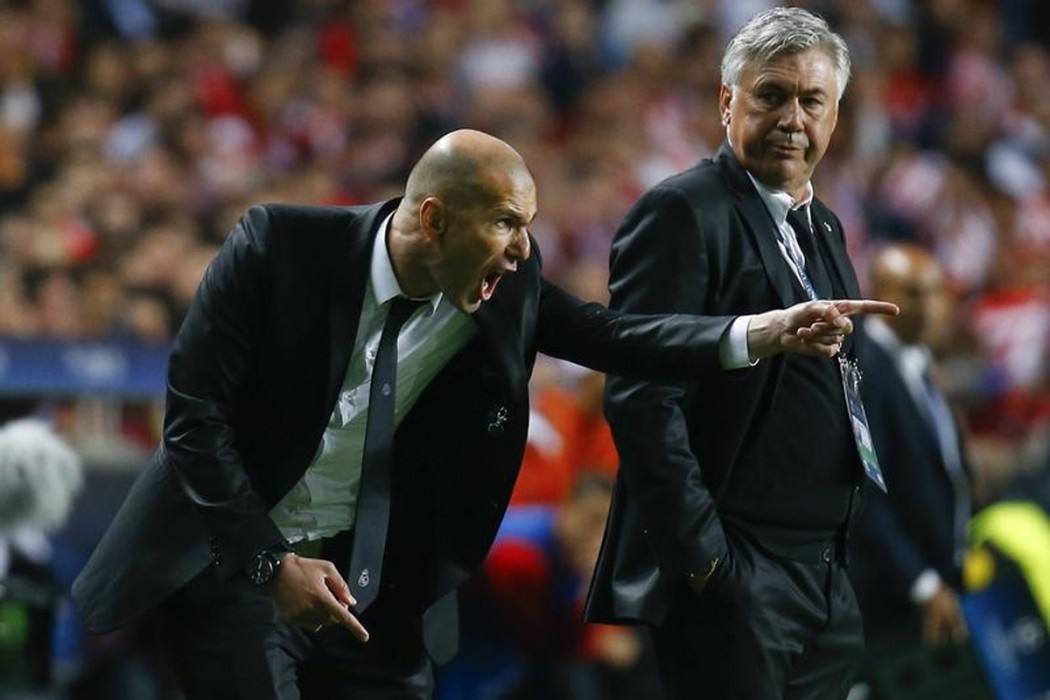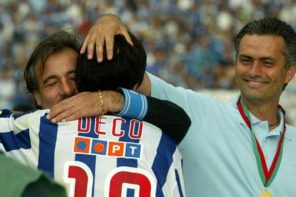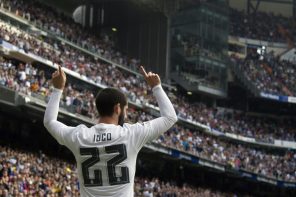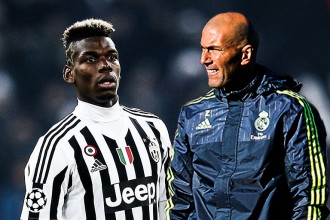Why hasn’t any great Number 10 become a great manager, reaching the heady heights they did as a player, and will Zidane break the mould?
It was early Spring 2015 and the two former Number 10s were making headlines due to their contrasting managerial situations.
Around the time news first surfaced that Zinedine Zidane was a very real candidate to succeed Carlo Ancelotti (ahead of schedule) as Real Madrid manager, another former playmaker, Gianfranco Zola, was fired as manager of Cagliari.
Florentino Perez eventually resisted the urge to hastily promote Zidane to the hottest seat in club football, and perhaps with good reason: as of yet, no great number 10 has gone on to enjoy equal, or greater success and adulation as a manager – but why?
Granted, not all great players have instantly equated to making great managers, regardless of position during their playing career; however it is curious to note the amount of great Number 10s who have failed to gain any significant success whilst in command at a top-flight club or on the international stage.
If/when Zidane does take the reins in Madrid (or any other top club) he’ll surely be the most high-profile former Number 10 to turn his hand to top-flight management since Diego Maradona.
Maradona was given one of the most prestigious coaching jobs in football with Argentina for the 2010 World Cup campaign, but the consensus was he’d done very little to earn it from a coaching perspective. Icon, inspiration and a leader of men on a pitch, sure, but a tactical and coaching prose was somewhat lacking in one bestowed with genius in his feet, not the chalkboards and intricacies of tutoring practicalities.
Brazil’s very own 80s superstar Number 10 has also attempted to forge a successful career in management; but aside from the odd cup success, perhaps the most remarkable thing about Zico’s post-playing career is the sheer variety of countries and cultures he’s coached in – ranging from Japan to India, via Turkey, Uzbekistan, Russia, Greece, Iraq and Qatar.
Completing a triumvirate of 80s golden age fantasisti who’ve entered the dugout is Michel Platini, who, after initially looking promising, ultimately failed. Taking the France job in 1988 less than six months after hanging up his boots, Platini guided his country impressively through qualifying for the 1992 European Championships in Sweden.
France excelled in qualifying, winning all eight of their group matches, and after a record 19-match unbeaten run, were rightly considered amongst the favourites to win the competition, with Platini even named Manager of the Year by the influential World Soccer magazine. That was as good as it got for the Frenchman.
A host of uninspiring performances prior to the 1992 tournament, followed by France’s shock first-round elimination, led Platini to step down as coach.
Why have such geniuses of the game been unable to translate their own match-winning feats to coaching? Could it be that their brilliance, which encapsulated elements of magic and mystique rather than being practical and consistently functional, cannot be passed on to others?
Gheorghe Hagi is another to have had a series of disappointments and sackings during his coaching career at both club and international level, whilst the aforementioned Gianfranco Zola has suffered two sackings (and a resignation) at the three clubs he’s managed so far.
Kenny Dalglish was arguably one of only a handful of players the British Isles produced resembling a fantasista and took over a winning machine in Liverpool in the 1980s, leading the team to a domestic double, famously as player-manager. It’s a shame at the height of his powers he was denied the chance to pit his wits against the continent’s best due to the English ban in Europe.
Just under a decade later Dalglish led unfashionable Blackburn Rovers (albeit backed by Jack Walker’s millions) to the Premier League title – although by this time the aforementioned ban in Europe had truly taken its toll and left English club side’s in a tactical time-warp.
On the positive side, Michael Laudrup has flown the flag for managerial fantasisti – albeit fleetingly; notably at Getafe and Swansea – combining relative success whilst fashioning teams in his style; always attempting to play creative, attractive football with more responsibility and freedom given to his players. However, his methods have inevitably had short-term effects: his positive influence lasting around two seasons and no more.
Another forging a career into the world of coaching is current River Plate boss Marcelo Gallardo. A club legend, Gallardo led the Buenos Aires side to victory in the 2015 Copa Libertadores – as he did as a player in 1996 – to add to the Copa Sudamericana they won in December 2014, meaning under his stewardship Los Millonarios hold both of South America’s top club competitions.
In terms of high-profile titles won – if European football is seen as the benchmark – then Roberto Mancini has possibly been the most successful Number 10 coach to date during his first stint at Inter Milan, and at Manchester City. However both times have had mitigating circumstances.
His domestic successes at both clubs are offset by winning in the wake of the Calciopoli scandal in Serie A, and the riches at his disposal at both clubs – particularly at City where the most expensive squad in history was being assembled.
More interesting than purely looking at this success however is how his coaching methods have distinctly differed from how he operated as a player, and, crucially, the coaching thesis he submitted at the beginning of his managerial career.
Named ‘The Trequartista’, Mancini put forward the notion of using a Number 10 correctly for a team’s benefit, in adversity to the rigid, tactically obsessed coaches dominating the modern game, empathising with his own plight as a player of never being used, or trusted, to naturally play in the desired role.
It seems the pressures of the results-first driven modern game at the top-level took its toll on Mancini, more often than not leading to a compromise – and even abandonment – of his original thoughts and principals from that thesis.
Though never a manager, Roberto Baggio has also indicated that this heavily influenced his decision never to go into management; one which was backed up by his experience of trying to change the culture from the very top.
As a player, Baggio repeatedly stated he would only be interested in coaching children (where the magic and wonder is still prevalent) rather than the cynical nature of the full professional game.
Thinking the role of Technical Director at the Italian Football Federation would allow him to influence a rethink from the top (tasked with reinvigorating the Italian game and its poor track record of blooding youngsters) he was repeatedly ignored, whilst the ingrained old-school culture of results-driven success was maintained. Baggio resigned, stating:
I presented my project, 900 pages, but they remained empty words. I don’t like just sitting on a chair but to do things, therefore reluctantly I have decided to leave.
It is too simplistic (and a lazy stereotype) to assume playmakers are carefree spirits on the pitch, and therefore lack real discipline to become truly successful managers; but are the ideologies of a Number10, by nature, too impractical to inforce consistently across a team at the highest level of coaching?
Back to Zidane then – can the former World Player of the Year break new ground in management? Having asked The Guardian’s Spanish football correspondent Sid Lowe if Zidane really is ‘the man’ for Madrid, he replied:
‘[Real Madrid’s] plan is very clear: Zidane. When that happens is less clear and depends not just on the club but on Zidane himself, who is very strong in terms of wanting to do things the right way and having the personality to resist pressure to simply follow presidential orders.
He is finding his feet and trying to define his own ideas and ambitions still. Is he a good manager? I’m not sure yet but he has a lot of the qualities necessary. He’s also much tougher than people think, more competitive.’
So will the former France Number 10 break the fantasista managerial mould and be as successful in the dugout?
I’ve got time, I’m learning. I did not become the player I was in two years, it’s the same in coaching,” said the 42-year old.
Zizou, it’s over to you.
Zinedine Zidane’s time in Munich, during which he visited the Bayern facilities and met with Karl-Heinz Rummenigge and Pep Guardiola, has borne out the vision that he had of the club: “The ideas that I had before coming here have been confirmed. It’s a well-organised club with people who’ve played the game and the sport runs through their veins. They breathe football here”.
The Castilla boss considers Pep Guardiola’s presence at the club to be a reinforcement of the club’s footballing philosophy: “All of it, combined with Guardiola and his squad, gives me the impression that this is a great club which always intends to play good football and to live by a defined philosophy”.
The Bavarian giants’ training facilities also caught Zidane’s eye when he checked them out for the first time: “It’s my first visit here. I’d been to Munich several times, but it’s my first time in this fabulous training ground. It’s not as big as what they have at other European clubs, giving it a more personal feel. The facilities are incredible”.
The Frenchman’s final word was that “Bayern are a great club that stand among the top five in the world, but at the same time there’s a family feel here”.








